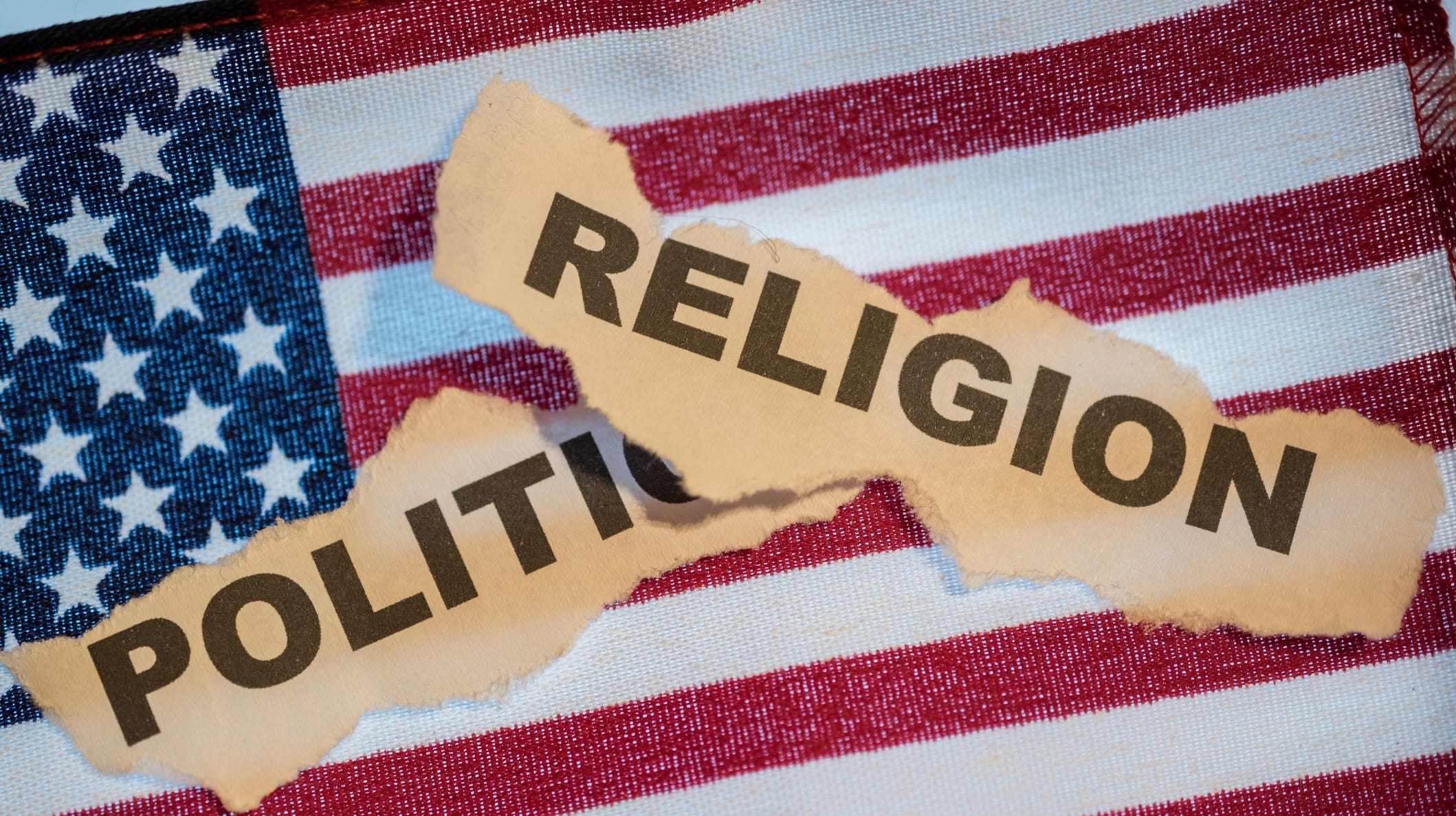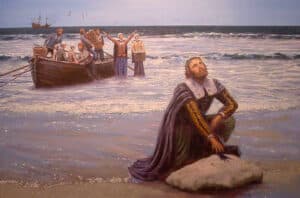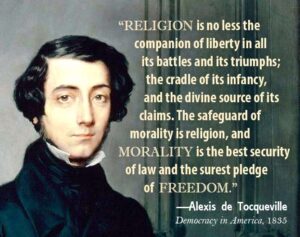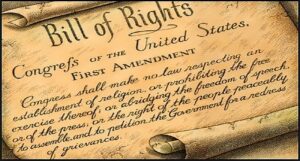
By Matt Rowe
October 25, 2021
Most Americans have been indoctrinated with—and seem to accept—the idea that there must be a “separation of church and state” for our country to prosper. Nothing could be further from the truth from our Founders’ intentions when creating the US Constitution.
The Founders’ intent in stating that “Congress shall make no law respecting the establishment of religion, or restricting the free exercise thereof…” was wholly focused upon the idea that the federal government could not prescribe or regulate religion to the people. This is exactly the opposite of English law which declares the King as the head of the Church. It is the reason the original pilgrims landed at Plymouth Rock—to freely practice their beliefs without persecution by the government.
 Moreover, our founders knew that religion was essential to a successful government. According to Alan S. Kahan a historian and political theorist who teaches in Paris and has reviewed the analysis Alexis de Tocqueville made about American Democracy:
Moreover, our founders knew that religion was essential to a successful government. According to Alan S. Kahan a historian and political theorist who teaches in Paris and has reviewed the analysis Alexis de Tocqueville made about American Democracy:
“…Tocqueville stood out as a friend of religion who was also a friend of freedom. He thought that a vibrant religious life was essential to the preservation and prosperity of a free democratic society. Tocqueville thought that religion (and he was favorable to almost any kind of religion) was essential to democracy for many reasons. Probably the most important one was that Tocqueville thought that organized religion was the only possible long-term counterweight to some of the main threats democracy faced: materialism on the one hand and religious fanaticism on the other.”
Tocqueville was convinced that for American Democracy to be successful it had to rely on the morality of its leaders and that religion gave them the needed moral framework.

What is lesser known is that the Founders also believed the matter of government interaction with religion should be left up to the states. In other words, though the Constitution forbade any government from establishing a proscribed religion or preventing the free exercise of any religion, the individual states could make laws affecting religion. For example, Thomas Jefferson refused to declare a religious “day of thanksgiving” while President but had no qualms against doing so as Governor of Virginia.
It is obvious, and well supported by their writings and subsequent actions, that the Founders fully believed this new form of government could only survive if managed by good and moral men, and that these men were trained in morality and right behavior via their education in Judeo-Christian values – 11 of the 13 new states had religious qualifications for holding state offices.
In 1798, President John Adams stated, “We have no government armed in power capable of contending in human passions unbridled by morality and religion. Our constitution was made only for moral and religious people. It is wholly inadequate for the government of any other.”
This is not to say that our Founders were not also concerned by the potential for conflict arising from religious issues. President James Madison pointed out, “Rulers who wished to subvert the public liberty may have found an established Clergy [as] convenient auxiliaries. A just Government, instituted to secure and perpetuate it, needs them not.”
Nonetheless, though the Founders were imperfect men of different opinions on many issues, they came to a consensus on our Constitution, and it was ratified in 1788.
For the first century and a half, the establishment of religion clause was not much challenged in the United States. Over time, however, as the population became more diverse, debates and legal challenges to existing law became more common. For example, should a non-Christian business be forced to close on Sundays due to the religious beliefs held by others? After WW2, given these types of challenges, the US Supreme Court interpreted (wrongly) that the meaning of the clause was essentially the concrete “…separation of church and state.”
This new constitutional interpretation – and many others since – is the result in large part of the 14th Amendment’s focus on language directed specifically at state governments, e.g., “No state shall make or enforce…nor shall any state deprive…’’
This 1868 Amendment was aimed at protecting the rights of former slaves, yet due to its wording came to be used much more broadly than its authors or the Founders ever intended. Many scholars argue that this Amendment is, in effect, applying the Bill of Rights against the individual states, as opposed to limiting only the federal government as originally intended.
If you read the Bill of Rights carefully, you see that the 1st Amendment begins with “Congress shall make no law…” indicating this statement applies only to the federal government. The 2nd Amendment, on the other hand, gives no specific government target and instead declares that “…the right of the people…shall not be infringed.” This means it is intended to apply to every government in the nation as the right applies to all people.

Sadly, this new interpretation against the states has forced them to behave exactly like the federal government and has been used to limit their freedoms to operate under local laws, needs, and traditions. The free exercise of religion has fallen prey to this interpretation and has resulted in more and more religious activities, statements, displays, and even speech being taken out of the public sphere rightly controlled by the individual states. Religious issues that permeate our culture, like the Pro-Life Movement are no longer allowed to be discussed in our schools for fear of religious indoctrination. Military chaplains are barred from even speaking about religious subjects to their charges, like transgenderism and homosexuality. Public displays with any religious meaning or foundation are forbidden, vandalized, and removed. One dare not speak of religious issues in the workplace either, for fear of losing employment.
The impact of this change in constitutional interpretation has been dramatic. Our society has slowly morphed into valuing individual worth at the expense of even considering the negative impact upon, or the greater good of the society as a whole. Religion, our firmest source of morality, has been denigrated and completely removed from the public and most private forums. Amoral behaviors, with demonstrable harmful effects on the individual and our society, have become the norm. Bad behavior, such as making immoral business or financial decisions simply because there is no law against it (yet), is more and more common. Corrupt politicians, who used to at least try to hide their self-enriching schemes and lies, now lie to our faces despite the obvious truth. People of faith are considered hateful of women, gays, and others simply because they do not agree with them socially, politically, or endorse their lifestyles.
Finally, we are witnessing the final stages of the Balkanization of our great country. It is a direct result of the divide between those who understand that this country can only survive by understanding that there is something much greater than the individual, versus those who make up their own rules of behavior and view themselves as greater than anything else. The Founders saw this threat and created a system to prevent it. We should look back to what they put in place rather than reinterpret what they created based upon selfish convenience.
